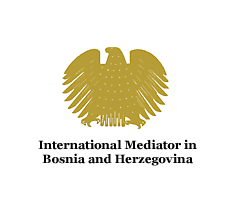TRIP REPORT 2/2000 - 28 MAY-3 JUNE 2000
IntroductionWhile Bosnia's municipalities are moving slowly towards normalisation and are beginning to respect individual rights, the world's attention, tired of promises not kept, is turning away from Bosnia. It is no longer a question of whether to cut budgets and aid, but how and when they will be reduced. For example, in the EU budget the total money allocated for Bosnia, Montenegro, Albania and Croatia over the next four years will remain about the same. But within this budget, the individual programmes for Croatia and Montenegro will increase significantly. This means less money for technical assistance and reconstruction in Bosnia. This reduction will not be felt immediately, but will, nevertheless, have a great impact.
Part of the problem is a feeling in the international community that too much money and time has been lost and wasted; and in some cases this is true. For example, in Mostar, where the atmosphere has greatly improved, most of the points of the last agreement, signed by cantonal officials and the Mediator in May 1999, have not been implemented; or they have been partially implemented in the last ten days. At the same time, in many places that the Mediator visits, there is an enormous difference between three years ago and the present. At that time, many international organisations did not believe that "minority return" was possible. Mediation took many hours and participants argued and negotiated lists of possible returnees, for example 110 to Stolac or 200 to Bugojno. Then slowly negotiations centred on villages near major towns, such as near Mostar or Vitez.
In 1998, 60% of houses reconstructed in Central Bosnia remained vacant. Croat children in Bugojno, returnees in Mostar, Serbs in Drvar, all appeared impossible. In Bugojno, Mostar and Drvar, houses continued to be destroyed long after the war had ended. In 2000, a new mayor in Bugojno, changes in Croatia and a new HDZ leader in Mostar have managed to change the atmosphere. It is now possible to talk about Croat schools in Bugojno, property rights implementation in Mostar, and the withdrawal of the HVO from Drvar. One can notices the difference, when one speaks to the new mayors of Zenica or Bugojno or the authorities in Mostar,. During this trip those leaders have all made commitments and promises to implement the rule of law, but they also complained about not having enough support.
Times are changing in Bosnia, and it is up to the international community to acknowledge that democracy and peace implementation take time and effort to be secured in a post war environment. In his address to the Peace Implementation Council meeting, the Mediator called in the international community to ensure the highest priority for return and property rights, to strengthen the Bosnian state institutions and to reform the economy by focusing on functional integration in key sectors.
On this trip the Mediator focused more on bilateral meetings in Sarajevo than on mediations, as he had just returned from the recent Peace Implementation Council meeting. However, he also visited Mostar for a follow-up meeting and held informal discussions in Bugojno and Zenica. In Sarajevo the Mediator met with Mr. Edhem Bicakcic (Prime Minster of the Federation of BaH), General Ronald Adams (Commander SFOR), H.E. Hans Jochen Peters (German Ambassador), H.E. Ralph Johnson (Principal Deputy High Representative), H.E. Matei Hoffmann (Senior Deputy High Representative), Mr. Ante Jelavic (Member of the BaH Presidency), Mr. Werner Blatter (UNHCR Special Envoy), Mr. Ulrich Bucher (OHR Special Envoy for Bugojno) and Mr. Ivo Adric Luzanski, Vice President of the Federation of BaH. The delegation consisted of the International Mediator, Dr. Christian Schwarz-Schilling, Mr. Dieter Wolkewitz (Executive Representative), Mr. Gerald Knaus (Political Advisor and Sarajevo Representative), Mr. Juan Diaz (Political Analyst), Ms. Amela Curkovic (Interpreter). During his visits, the Mediator was accompanied by Mr. Goran Magas, the Advisor to the Federation Vice-President and Special Envoy for Drvar, Mr. Salko Beba, First Secretary of the Federation Vice-President, Ms. Mirsada Jahic, the Co-ordinator of the Task Force Group in the Federation Prime Minister's Cabinet for the Support of the Mediator's Activities and Mrs. Sabira Jahic, Assistant to the Federation Minister for Refugees.The delegation would like to express its special gratitude to OSCE Operations for its logistical support; OHR, RRTF and OSCE officers in Sarajevo Mostar, Bugojno and Zenica for providing input and organisational support. During the trip the delegation was assisted also by ECMM, IPTF,OHR/RRTF, OSCE, SFOR, UNHCR and the Federation Ombudsmen.

